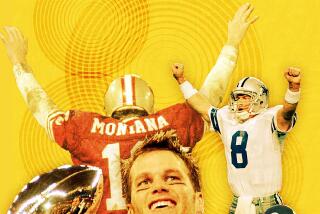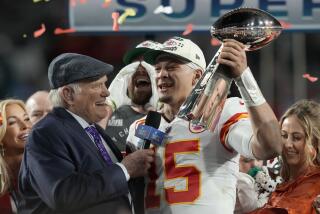Hunter knows about replacing a legend
- Share via
Aaron Rodgers is not the first man given the unenviable assignment of filling the cleats of a legendary former Green Bay Packers quarterback.
Scott Hunter had the privilege 36 years ago.
And it was a privilege, says Hunter, who not only took over for Bart Starr in 1972 but did so with the two-time Super Bowl most valuable player looking over his shoulder and endlessly critiquing his performance as a quarterback advisor to then-Packers coach Dan Devine.
Starr even called the plays.
“I worked very closely with him and was schooled very carefully by him,” Hunter, 60, says from Daphne, Ala., where he’s an investment advisor. “He was such a great guy to play with and to be coached by that it was an easy transition, in a sense. It was a little different than what they’re going through now.
“Bart, for the most part, was at the end of his career and all the Packer fans knew it and knew that a transition was coming, so I don’t think it was as difficult as the situation with Brett Favre and Aaron Rodgers.”
In 1971, an arm injury had limited Starr to only three starts, none of them Packers victories. Hunter started 10 games as a rookie, had 17 passes intercepted in 163 attempts and the Packers won only four games, finishing last in the Central Division. Starr turned 38 shortly thereafter, but the man who led the Packers to five NFL championships in the 1960s wasn’t quite ready to retire.
Hunter, meanwhile, waited patiently in the wings.
Like Starr, the 200th player taken in the 1956 draft, Hunter was a low-round pick from Alabama. Devine had ignored the advice of his scouting staff and made Hunter the 140th pick in the 1971 draft, the then-newly hired coach hoping he might have the same kind of luck with Hunter that Vince Lombardi had with Starr.
Hunter had been a three-year starter at Alabama under Paul “Bear” Bryant, and had spent a great deal of time studying Starr on television.
“I wasn’t an option quarterback or the kind of guy that was going to scramble around like Fran Tarkenton,” says Hunter, who broke most of Joe Namath’s school passing records at Alabama. “I was more the Bart Starr-type operator, if you will, that was going to back up in the pocket, read the coverages and throw to the right guy, so Bart was the kind of guy I admired and emulated.
“Plus, I’d see Bart in the off-season when I was at Alabama. You’d go to a banquet in Birmingham and he’d be there, and I’d have a chance to talk with him.”
So even after struggling as a rookie, Hunter was confident approaching his second season. Nor did it worry him that he might soon be replacing an icon. At Alabama, after all, his predecessors had included Starr, Namath and Ken Stabler.
“It wasn’t like I hadn’t played in an environment where there were some great legacy-type quarterbacks,” Hunter says, “so I was somewhat used to it.”
Then Starr, still hurting, called it quits in the summer of 1972.
Hunter calmly stepped into the breach and, taking advantage of a strong running game led by John Brockington and MacArthur Lane, helped the Packers to a 10-4 record and the NFC Central Division championship, the last they would win until Favre carried them to the top of the division 23 years later.
“Scott’s a bright man and he has a good mind,” Starr told Sports Illustrated early in the 1972 season, “and I think he’s finally learning some discipline.”
Unfortunately for Hunter, who cut down on his interceptions but wasn’t much better statistically than he’d been as a rookie, the Packers lost in the first round of the playoffs -- and he never experienced another season nearly as productive.
Two years later, the quarterback and the head coach butted heads over an NFL players strike that marred the 1974 exhibition season.
“Coach Devine offered me a big contract and a nice bonus to come to camp and I called Coach Bryant down in Tuscaloosa to ask him what I should do,” Hunter recalls, laughing. “Of course, his answer was, ‘Where are the offensive linemen, Scott?’ I said, ‘Coach, they’re out there with picket signs marching around the stadium.’ And he said, ‘You’d better be out there with them.’ ”
Devine disagreed, trading Hunter to the Buffalo Bills.
Hunter retired in 1979, having also played for the Atlanta Falcons and Detroit Lions. He appeared in 64 NFL games, compiling a 21-18-3 record as a starter.
Before becoming a financial advisor eight years ago, he was a sports director at the CBS affiliate in Mobile, Ala., and a college football television analyst. He and wife Deborah, a former Alabama cheerleader he married in 1971, have three grown children, all Alabama graduates, and five grandchildren.
His NFL career might not have unfolded as successfully as he would have liked, but Hunter remembers it fondly, especially his time with the Packers.
One day, Hunter hopes, Rodgers can say the same.
--
More to Read
Go beyond the scoreboard
Get the latest on L.A.'s teams in the daily Sports Report newsletter.
You may occasionally receive promotional content from the Los Angeles Times.










